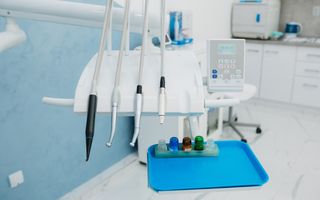
Regular Examinations
Regular examinations enables our dentists to pick up any small problems when they are relatively straightforward to treat.
Why Have Regular Examinations?
Regular examinations form the cornerstone of a good preventative dental care plan. We generally recommend patients visit Blue House Dental every six months, but this does depend on your individual oral health needs. Some people with particular medical issues may benefit from more frequent check-ups. This may apply if you have any medical conditions such as diabetes as this can increase the risk of gum disease. If you are pregnant we also may recommend additional check-ups as hormonal changes during pregnancy increase the sensitivity of gums towards bacteria in the mouth. We offer dental check-ups for all the family, and regular appointments are particularly important for growing children.
The great thing about regular examinations is that it enables our dentists to pick up any small problems when they are relatively straightforward to treat. It is much quicker, and often cheaper to repair small cavities or to replace old fillings than to wait for problems to develop. Any early signs of gum disease can be treated before this condition can cause permanent damage. This helps ensure your natural teeth remain strong and healthy for longer, and will keep your smile looking its best. It also reduces the risk of dental emergencies, as untreated tooth decay can eventually result in toothache or dental abscesses.

What to Expect during Your Regular Examination
During a regular examination our dentists will thoroughly check the inside of your mouth. This includes not only your teeth and gums, but all your oral tissues including your tongue, the roof and floor of your mouth and the inside of your cheeks. Each tooth is visually examined or carefully tested for any soft spots that could indicate the beginnings of tooth decay, and we use a special instrument to gently probe your gums. This is to check your gums fit tightly around your teeth. All these details are recorded so we can compare any changes in your mouth during your next regular examination. If necessary, we will also take dental x-rays to gain a complete picture of your current dental health.
Fissure Sealants
Your back teeth (premolars and molars) are particularly vulnerable towards developing cavities as they have lots of deep fissures that help grind up food more effectively. These fissures can be very difficult to keep clean, often trapping bacteria and food particles. It can be very difficult to get a toothbrush right into deep fissures to clean these areas thoroughly. Fissure sealants help protect these surfaces and have been proven to be very effective at helping to prevent tooth decay.
Oral Hygiene Appointments
Oral hygiene appointments are an excellent way to freshen up your smile, while helping to keep your teeth and gums healthy. We generally recommend you book an oral hygiene appointment at the same time as your regular examination.

Scaling and Polishing
Our hygienist will gently clean your teeth, scraping (scaling) away any calculus or tartar. This is hardened plaque bacteria that cannot be removed through regular brushing. If left in place it will eventually infect and irritate your gums, increasing the risk of gum disease. After scaling your teeth, our hygienist will polish them, helping to remove some surface stains. At the end of treatment your mouth should look and feel beautifully fresh and clean. This is a really nice treatment for brightening up your smile as hardened calculus is quite yellow in appearance.

Advice on Improving Your Oral Care Routine at Home
Our hygienist can work with you to help improve your oral hygiene at home through showing you different techniques for brushing and flossing and identifying any areas you may be missing during brushing. We know many people find it difficult to floss properly but being aware of the proper techniques can make it much easier.

Treatment for Gum Disease
If you have any signs of gum disease you may need to see our hygienist more frequently to help clear up this condition. Sometimes it can be treated through regular scaling and polishing, as this helps to remove infection enabling your gums to heal. However more advanced cases of gum disease may require your gums to be deep cleaned, a procedure that might also be called scaling and planing. This is a similar treatment to scaling and polishing, but removes calculus from just underneath your gum line where the gums have begun to pull away from the teeth due to periodontal or gum disease, creating gum pockets that become infected. Scaling and planing helps to remove bacteria from gum pockets around the teeth, and smooths the exposed root surfaces, making it harder for plaque bacteria to adhere.

Fluoride Treatment
Fluoride is a mineral that occurs naturally, and it can be found in certain foods, in particular fish, eggs and meat, and it sometimes occurs naturally in water. Fluoride is also found in tea. It has been proven to be very effective in helping to harden tooth enamel, lessening the risk of cavities.
Your tooth enamel consists of lots of tightly packed mineral crystals, and dental enamel loses and regains some of these minerals every day through a process called demineralisation and remineralisation. This occurs every time you eat something, as the mouth becomes more acidic due to the presence of plaque bacteria. This has the effect of softening the tooth enamel so some of the crystals are leached out during demineralisation. As the mouth becomes less acidic some of the crystals are redeposited back into the tooth enamel during remineralisation If you have adequate fluoride then it helps to disrupt the production of acids, and speeds up tooth remineralisation.
EMS AIRFLOW®
The AIRFLOW® Master has been specifically conceived for sub & supragingival prophylaxis, removing biofilm from natural teeth and implant surfaces. It’s ideal for orthodontic patients, hypersensitive patients and recall appointments, with the ability to treat hard-to-reach areas with clinical precision, reliability and comfort.
The AIRFLOW® Master is a complete AIRFLOW® station that combines two application systems in one device, with two working modes and two powder chambers to suit your every need. Using the interactive touch panel and sleek interface you can easily control the amount of powder and water irrigation with over 17 power levels to choose from and 12 irrigation settings. The water system also has a built-in heater that maintains the water temperature constantly at 37°C for a pleasant and gentle treatment.
When operated in the airflow mode, the unit delivers a gentle biokinetic energy that removes biofilm and stains whilst preserving the tooth’s natural structure. In “Perio” mode, the AIRFLOW® Master delivers a safe and effective periodontal biofilm removal thanks to the revolutionary PERIOFLOW nozzle. It’s safe on soft tissues, periodontal pockets, implants, restorations, cementum and palatal areas. To be used with the erythritol PLUS powder or the glycine PERIO powder.

Frequently Asked Questions
Most people will use fluoride toothpaste, but Blue House Dental offers additional fluoride treatments to help boost this effect. These can be very useful for people more at risk of developing cavities. This can include anyone who has a history of tooth decay or who hasn’t visited a dentist very frequently in the past. It may also be applicable to someone with less-than-perfect oral hygiene, and lifestyle choices can also make a difference. For example someone who snacks frequently is more at risk of developing cavities. This is due to the teeth being exposed to the acid produced by plaque bacteria for longer periods of time. Some people have a condition called dry mouth where insufficient saliva is produced to help wash away bacteria, and they may benefit from fluoride treatments to help protect their teeth.
Fluoride treatments can be in the form of a concentrated mouthwash, or a gel or foam that is applied to the teeth in a mouth tray. If necessary, we can also prescribe fluoride supplements.
We generally recommend fissure sealants are applied to children’s newly erupted back teeth, before any cavities develop, but adults with cavity-free teeth may also benefit. Fissure sealants consist of a very thin plastic coating that is painted onto the chewing surfaces of the back teeth, effectively sealing them so decay causing bacteria cannot enter. They are a great way to help prevent cavities, and the procedure to apply them is quick and non-invasive. Dental sealants can only be used on teeth that do not have any fillings or signs of decay and will last between five and ten years before they need re-applying.
If you do need fissure sealants then this treatment can be completed in one quick visit to Blue House Dental. First your teeth will be cleaned and dried before being painted with a special etching solution. This helps to slightly roughen the tooth surfaces due to be sealed, and the reason for this is to help improve the bond between the dental sealant and your tooth. The etching solution is then washed off and your teeth are dried once more. Next, your dentist will paint on the fissure sealant material, and this may be hardened with a special blue light or left to harden naturally. That’s all there is to this treatment, and you’ll be able to eat and drink normally soon after leaving our dental clinic.



